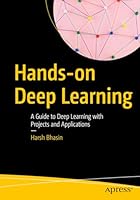
Natural Language Processing with Python Quick Start Guide
- Length: 182 pages
- Edition: 1
- Language: English
- Publisher: Packt Publishing
- Publication Date: 2018-11-30
- ISBN-10: 1789130387
- ISBN-13: 9781789130386
- Sales Rank: #3892952 (See Top 100 Books)
Build and deploy intelligent applications for natural language processing with Python by using industry standard tools and recently popular methods in deep learning
Key Features
- A no-math, code-driven programmer’s guide to text processing and NLP
- Get state of the art results with modern tooling across linguistics, text vectors and machine learning
- Fundamentals of NLP methods from spaCy, gensim, scikit-learn and PyTorch
Book Description
NLP in Python is among the most sought after skills among data scientists. With code and relevant case studies, this book will show how you can use industry-grade tools to implement NLP programs capable of learning from relevant data. We will explore many modern methods ranging from spaCy to word vectors that have reinvented NLP.
The book takes you from the basics of NLP to building text processing applications. We start with an introduction to the basic vocabulary along with a work?ow for building NLP applications.
We use industry-grade NLP tools for cleaning and pre-processing text, automatic question and answer generation using linguistics, text embedding, text classifier, and building a chatbot. With each project, you will learn a new concept of NLP. You will learn about entity recognition, part of speech tagging and dependency parsing for Q and A. We use text embedding for both clustering documents and making chatbots, and then build classifiers using scikit-learn.
We conclude by deploying these models as REST APIs with Flask.
By the end, you will be confident building NLP applications, and know exactly what to look for when approaching new challenges.
What you will learn
- Understand classical linguistics in using English grammar for automatically generating questions and answers from a free text corpus
- Work with text embedding models for dense number representations of words, subwords and characters in the English language for exploring document clustering
- Deep Learning in NLP using PyTorch with a code-driven introduction to PyTorch
- Using an NLP project management Framework for estimating timelines and organizing your project into stages
- Hack and build a simple chatbot application in 30 minutes
- Deploy an NLP or machine learning application using Flask as RESTFUL APIs
Who this book is for
Programmers who wish to build systems that can interpret language. Exposure to Python programming is required. Familiarity with NLP or machine learning vocabulary will be helpful, but not mandatory.
Table of Contents
- Getting Started with Text Classification
- Tidying your Text
- Leveraging Linguistics
- Text Representations – Words to Numbers
- Modern Methods for Classification
- Deep Learning for NLP
- Building your own Chatbot
- Web Deployments

Microsoft 365 Copilot At Work: Using AI to Get the Most from Your Business Data and Favorite Apps






